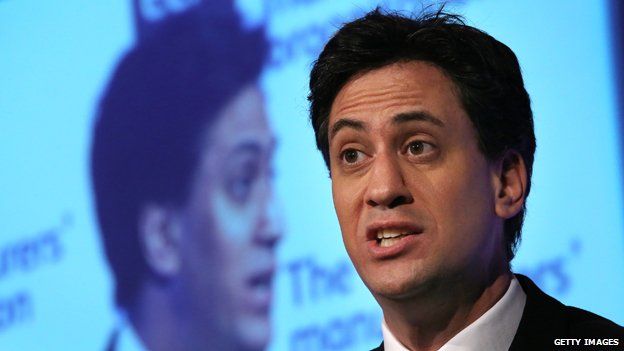Student-fee questions for Miliband
- Published
- comments

So as I mentioned a few weeks ago, Ed Miliband is about to confirm his plan to cut student tuition fees from £9,000 to £6,000.
What has been leaked overnight is that in some way he will pay for the £2bn-or-so upfront costs with cuts to tax reliefs on pensions.
All of this, right now, begs a huge number of questions.
Here are a few for the Labour leader to answer when he gives the detail of the reform at midday.
Can he make sure that the fee cut doesn't disproportionately help future high earners?
The Institute of Fiscal Studies calculates that a cut in fees from £9000 to £6000 will give almost zero help to graduates who will be in the bottom 50% of earners, such as teachers - in that under the current system they would expect to have much of their student debt written off when they enter their 50s.
Or to put it another way, cutting the fees would largely and exclusively help those who under the current system pay them off rapidly because they are on high earnings.
In other words, there is a likelihood that Ed Miliband will be helping graduates who go to work for hedge funds and Goldman Sachs.
Which he might say is a good thing, if those young hedgies and investment bankers come from poor families.
But if the IFS points out - which it plans to do - that he is disproportionately helping the top 10-20% of earners, that might be embarrassing to him.
There is obviously another set of issues around the funding of our universities - reassuring them that they will have the funds and autonomy to deliver the world class skills that the UK's economic future requires. Many of them have already publicly stated their opposition to the fee cut.
And finally there are bound to be big issues about the fairness or otherwise of whatever further tax raid there is on pension savings.
In recent years, our pensions have been the seemingly bottomless purse from which Tory and Labour chancellors have extracted many billions, from abolishing the tax credit for pension funds on dividends, to progressively shrinking the size of our pension pots, to limiting the amount we can put into pensions each year.
For Labour's shadow chancellor there have however been quite a few options for milking our pensions even more. They include:
- Shrinking the pension pot yet again, from the current £1.25m;
- Further reducing the amount that can be put into our pensions every year from the current £40,000;
- Significantly reducing the lump sum that can be taken tax free from a pension pot at retirement;
- Taking the proposal of the Lib Dem pensions minister Steve Webb that tax relief for those in the 40% tax-rate bracket should be cut to 28%, and possibly increasing tax relief for basic rate tax payers to that level (which would be seen as hurting the rich and helping the poor);
- Targeting the reduction in tax relief on those on highest earnings, say over £100,000 a year or so.
If he goes with logic, he may shrink the size of the tax-free lump sum available on retirement. Since it has always seemed a bit odd to some that there should be tax breaks both on saving and on cashing in a pension.
But although limiting the tax breaks to the saving might appear rational, it would certainly cause a sharp intake of breath for those currently approaching retirement and already banking on that lovely tax-free nest egg.
As for limiting tax relief on saving, it could potentially raise billions if it was targeted on all 40% rate earners. But it would be quite a brave Labour Party leader who announced a thinly disguised tax rise for the more than four million households in this tax bracket. And neither Ed Balls or Ed Miliband would presumably wish to sign what some would see as a general election suicide pact.